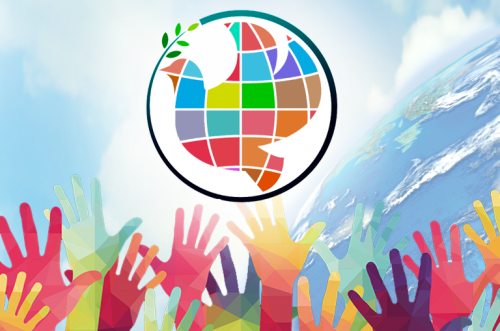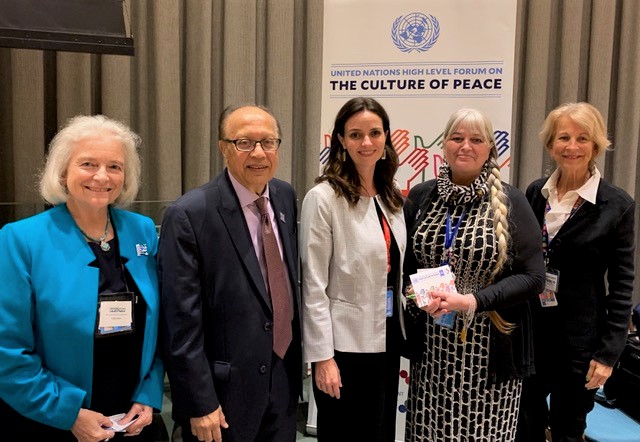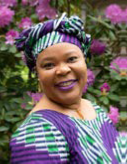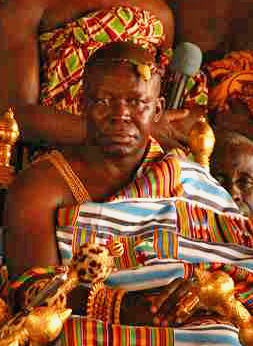
► The Culture of Peace: Empowering and transforming humanity

.jpg)


He concluded by affirming, “We have the means, the technology, the knowledge and the resources to deal with current and emerging challenges. Let us use the occasion of this anniversary to rekindle the fire in our belly, reenergize ourselves and renew our collective commitment to make the world a better place for all.” But, he forewarned, “History will never forgive nor absorb us if we fail to stand by the courage of our convictions and live up our responsibilities by promoting The Culture of Peace on a sustainable basis and thereby ensure a serrated implementation of the UN 2030 Sustainable Development Goals.”
► How the resolution aligns with the Sustainable Development Goals

.jpeg) Ambassador Chowdhury correlated the follow-up resolution’s alignment with the 2030 Sustainable Development Goal 16, which aims to “Promote peaceful and inclusive societies for sustainable development, provide access to justice for all and build effective, accountable and inclusive institutions at all levels.” Also, he identified Goal 4 on education and Goal 5 on women and girls as having key relevance to the culture of peace.
Ambassador Chowdhury correlated the follow-up resolution’s alignment with the 2030 Sustainable Development Goal 16, which aims to “Promote peaceful and inclusive societies for sustainable development, provide access to justice for all and build effective, accountable and inclusive institutions at all levels.” Also, he identified Goal 4 on education and Goal 5 on women and girls as having key relevance to the culture of peace.
He noted the resolution’s specific operative paragraphs that further align with the mission of the ECPC that aims “To create an inclusive movement for peace, social cohesion, social justice, and the prevention of violence through using early childhood development strategies to enable the world community to advance peace, security and development”:
- Operative Paragraph (OP) 6: “commends the practical initiatives and actions by relevant United Nations bodies, including the United Nations Children’s Fund (UNICEF), the United Nations Entity for Gender Equality and the Empowerment of Women (UN-Women) and the University for Peace”, as well as encourages the strengthening and expansion of their efforts”;
- OP 7: “underlines that early childhood development contributes to the development of more peaceful societies by advancing equality, tolerance, human development and promoting human rights, and calls for increased investment in early childhood education through effective policies and practices as means towards advancing a culture of peace”;
- OP 9: “encourages the United Nations Alliance of Civilizations to increase its activities that focus on peace education and global citizenship education to enhance understanding among young people of values such as peace, tolerance, openness, inclusion and mutual respect…”;
- OP 11: “urges the appropriate authorities to provide age-appropriate education in children’s schools that builds a culture of peace and promotes non-violence by including lessons in mutual understanding, respect, tolerance, active and global citizenship and human rights”;
- OP 12: “encourages the involvement of media, especially the mass media in promoting a culture of peace and non-violence, with particular regard to the children and young people”;
- OP 14: highlights the role of civil society and non-governmental organizations to further develop interorganizational efforts to promote a culture of peace in accord with the UN system;
- OP 15: encourages the annual observance of the International Day of Peace (September 21) and the International Day of Non-Violence (October 2) by all UN entities and civil society organizations;
- OP 20: requests that the UN Secretary-General present a report to the UNGA in 2020 on the implementation of the “Follow-up to the Declaration and Programme of Action on a Culture of Peace” representing the actions taken by Member States and system-wide by all concerned UN entities.
► More information
- Early Childhood Peace Consortium (ECPC) News. (2019). Building The Culture of Peace: Empowering and transforming humanity.
- United Nations. (2019). Follow-up to the UN Declaration and Programme of Action on a Culture of Peace A/74/21.
- UN Web TV. (2019). United Nations High Level Forum on The Culture of Peace - 20th Anniversary Convened by the President of the 73rd Session of the General Assembly
- UN Web TV. (2019). UN High Level Forum Panel Discussion | Building The Culture of Peace: Empowering and transforming humanity.
- United Nations. (2015). A/RES/70/1. Transforming our World: The 2030 Agenda for Sustainable Development.
- United Nations. (1999). A/RES/53/243. Declaration and Programme of Action on a Culture of Peace.
- United Nations. (1945). Charter of the United Nations.
► Get the facts
Be informed. Learn more about, Realizing The Culture of Peace.
► Follow us
Stay connected! Follow the Early Childhood Peace Consortium (ECPC) on Facebook, Twitter, iTunes and YouTube.
Photo credits
- Above image of Ms. Leymah Gbowee is used courtesy of the programme booklet for the UN High Level Forum on The Culture of Peace for the event convened by the President of the 73rd Session of the UNGA on 13 September 2019 at the UN.
- Above image of HRM Otumfuo Osei Tutu II, Asantehene (King of the Ashanti people of Ghana) is used courtesy of Wikimedia Commons, Flickr: Self-published work by Retlaw Snellac.
- Above image of Ambassador A.K. Chowdhury is used courtesy of GMCoP.
Submitted on 03 February 2020 by Bekir B. Artukoglu, N. Shemrah Fallon.

